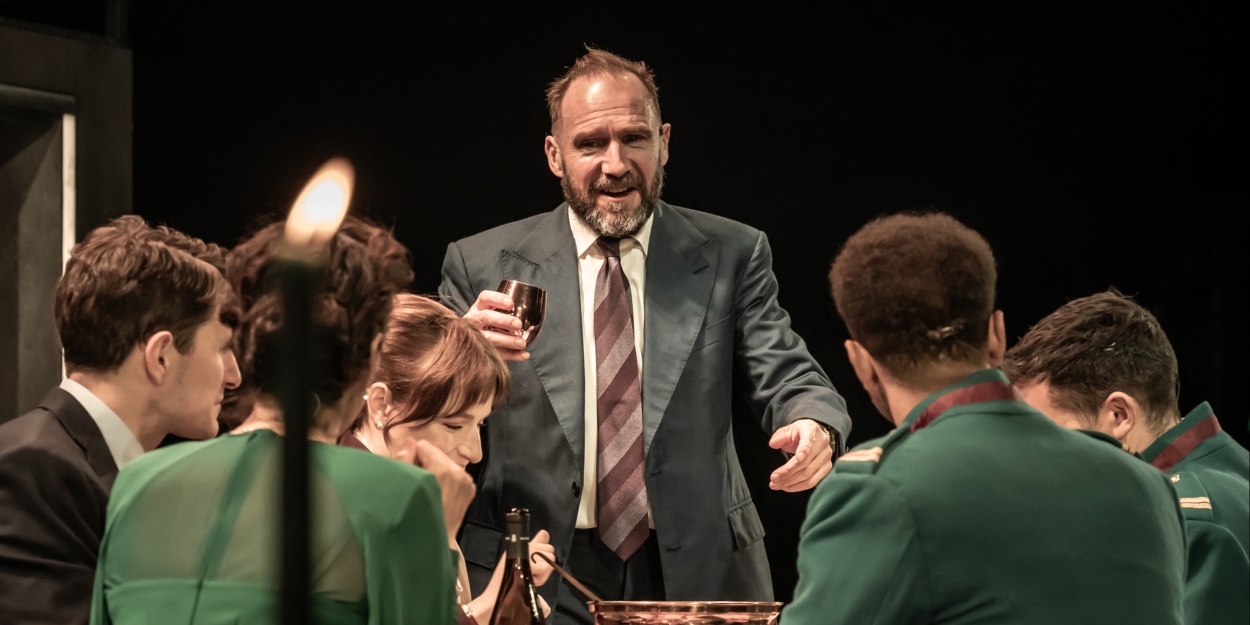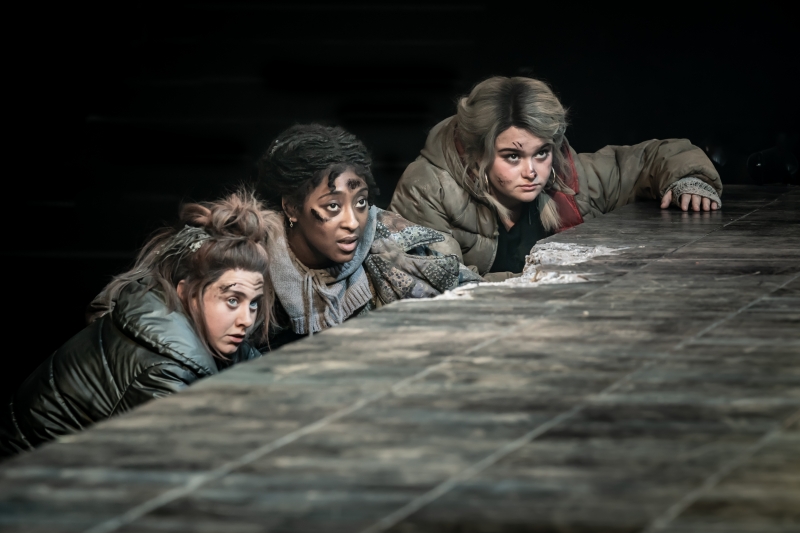Review: MACBETH, Dock X
The production runs at Dock X until 30 March

![]()
“You have displaced the mirth”
Entering Dock X in Canada Water for Emily Burns’s adaptation of Macbeth, starring Ralph Fiennes and Indira Varma as the Macbeths, you are greeted by a large, dark space filled with audience members, jazz music playing as you wait for the theatre itself to open.
Suddenly, a siren begins to wail, cutting off the music and causing several people to jump in surprise. This is the call to enter the theatre and, as audience members walk through the tours, they are greeted by scenes of destruction and soldiers staring with empty eyes at the chaos around them. But once seated, you quickly realise that this is the extent of immersion, as the stage itself is simply in the thrust style.
The show itself begins with a large explosion and the three witches (Lucy Mangan, Danielle Fiamanya and Loal Shalam) emerge from the destruction, shellshocked and covered in dirt and rubble. Simon Godwin is giving us a modern adaptation of Macbeth, but this has little to no effect on the play itself. Frankie Bradshaw has designed a fascinating set, with a minimalist stage and the wartorn scenes surrounding it. When in settings like Macbeth’s castle, walls come out and block out the outside world, making for some impressive moments when the walls recede and we are reminded of the world outside of Macbeth.
There are also moments in which actors walk through the aisles of the audience, using them as a means of showing distance. During Lady Macbeth’s sleepwalking scene, Varma goes out into the audience, taking a man’s hands in hers as she murmurs, “What’s done cannot be undone” before taking her leave.
It is difficult to imagine Fiennes as a warrior on the battlefield, especially one like Macbeth who is seen as nearly unvanquishable along with Banquo (Steffan Rhodri). In fact, throughout the first act, Fiennes tends to perform in a monotonous fashion, rarely changing the level of his voice and delivering any humourous lines with a deadpan expression. An older Macbeth is quite effective in the second act, however, as he grows weary and Fiennes plays these scenes brilliantly, showing the audience a man who is aware that his grasp on power is slipping as madness overtakes him. His “Tomorrow” monologue is brilliant and I wish we could have seen more of Fiennes’s performing at this level throughout the show.
The choices made for Lady Macbeth are also different than your typical production of Macbeth. There appears to be no chemistry between Varma and Fiennes and, at times, Varma plays Lady Macbeth are either scared of or disgusted by her husband, refusing to comfort him but also recoiling from his touch at several times. Lady Macbeth also goes against her own advice to Macbeth to hide his true feelings, not hiding her concern when at supper with Duncan and his men. The moments in which Varma truly shines are when Lady Macbeth loses her mind, stumbling around the stage and desperately attempting to wash the unseen blood from her hands.
Along with changes made to the Macbeths, there are also several changes made throughout the show that tend to lead to more questions. The witches appear more often than they do in typical productions, actually revealing themselves to Lady Macbeth in several scenes, which takes away from her going mad because of her own choices, instead implying that her insanity may have been caused by the supernatural. I did, however, appreciate the witches appearing during the final scenes, watching the chaos they prophesised unfold.
The porter scene is cut, along with Hecate’s appearance to the witches. Seyton (Jonathan Case), the loyal servant of the Macbeths, makes the bizarre decision to betray them, something incredibly out of character for a man who has dedicated his life to serving Macbeth and Lady Macbeth.
Siward’s son is simply an Easter Egg for eagle-eyed fans who notice the name on his uniform, with no mention of his death even though his dead body remains on stage in the aftermath of the battle. The two murderers hired by Macbeth to kill Banquo (Jake Neads and Michael Hodgson) play a larger part in the show, including being used as vessels for the witches when they give their second prophecy to Macbeth.

The highlights of the show? Ben Turner as Macduff and the final battle. Turner is a marvel to watch as the powerful Macduff, expressing both heartbreak and fury with awe-inspiring acting. His conversations with Malcolm (Ewan Black) are a brilliant example of just how great Shakespeare can be when it is simply two people talking to one another. But, on the other hand, the final battle is a fantastic illustration of theatrical fierceness, with Macduff and Macbeth’s fight (directed by Kate Waters) being genuinely intense and heart-stopping even though you know how it will end.
Macbeth makes some interesting choices in placing the play in a modern, war-torn setting, but fails to truly develop on what could have been a fascinating reflection on the effects of war. Fiennes and Varma struggle to depict a couple who go mad with power together, instead on their own separate journeys throughout. The strength of the show lies in its supporting characters who rise above even the Macbeths themselves, making for a fantastic second act.
Macbeth runs from 10 February to 30 March 2024 at Dock X in London. It will then be in Washington D.C. from 9 April to 5 May 2024.
Photo Credit: Marc Brenner
Comments
Videos

